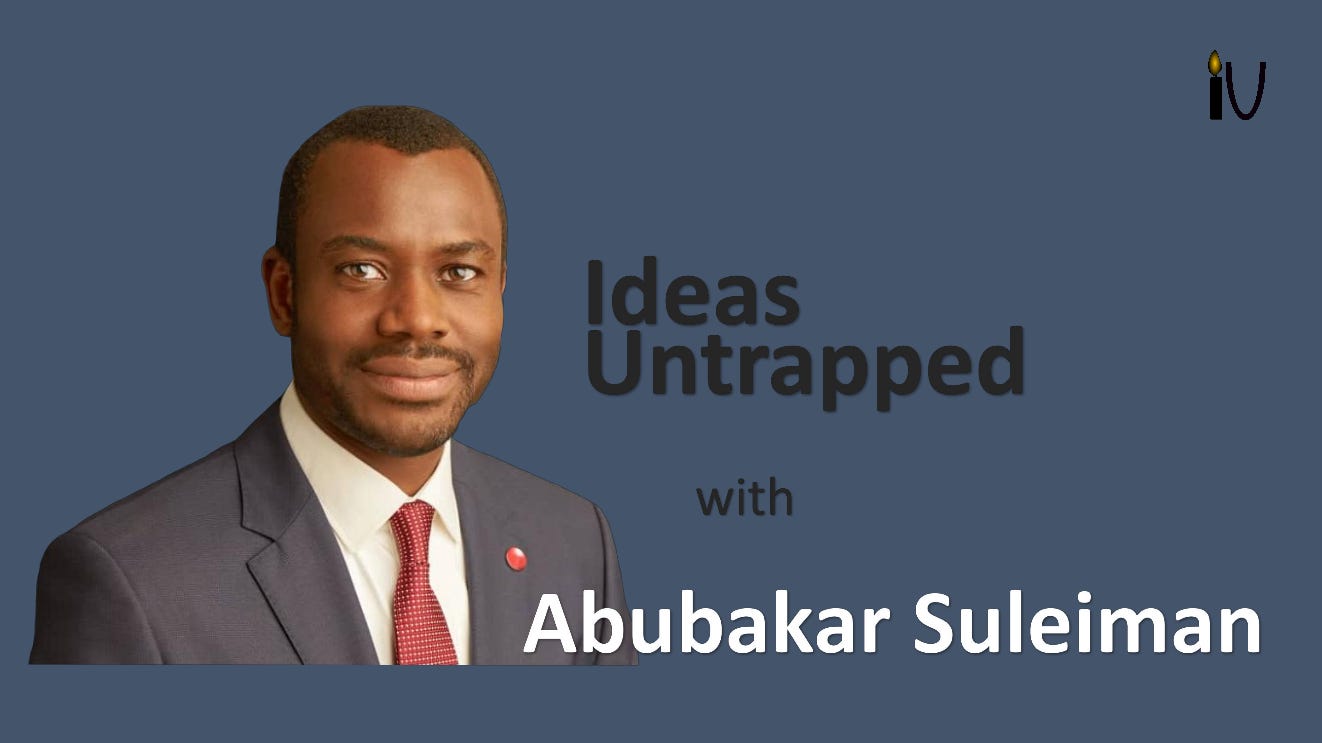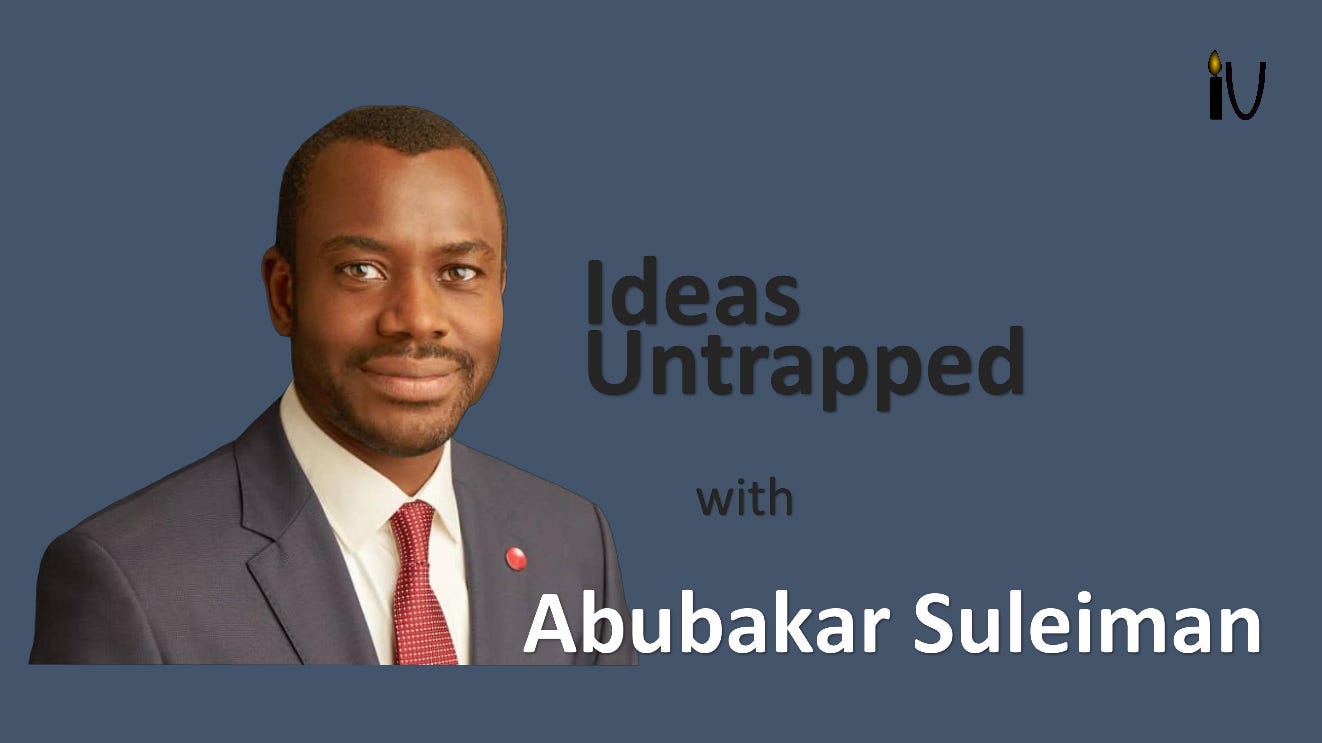
Abubakar Suleiman, who is the Chief Executive Officer and Managing Director of Sterling Bank, is certainly the most interesting banker in Nigeria. In this conversation, we explored the nature of the relationship between business and government - with focus on regulation and the cost of compliance - and the thing that needs to change in that relationship.
Transcript
Tobi: You're listening to Ideas Untrapped and today I am honoured to be speaking with Abubakar Suleiman who is the MD and CEO of Sterling Bank. He's a man I respect so much and a very interesting thinker. You're welcome.
Abubakar: Thank you.
Tobi: I'll start with a basic curiosity which is if we go back, say, about a decade ago from the banking crisis that we had where it started globally, but it changed the financial landscape of our economy, so to speak. In your view, what are the most enduring legacies of that experience? Because, for me, one thing that I see (and I'm open to being wrong about this) is that it expanded the regulatory role and the oversight of the Central Bank in a way... because it had to step in, do a clean-up of the system, provide liquidity and I believe there are costs to that which are kind of feeding into the system now...what are your views on that?
Abubakar: Sometimes it's difficult to argue that the lesson from a decade ago where was really learnt. You'll see behaviours that suggest that we may have gone back to business as usual. But in one area where we have not reversed completely the changes that were imposed on the system is actually in the cost of doing business and the cost of compliance. So, from a business perspective, I think of it as the cost of compliance. The most obvious one is that the scale of capital that you need now to play in financial services has suddenly been ramped up. And so if you were here in 2004 or 2005 before the consolidation, you could very easily start a banking business with 2 billion naira. Today, it would be risky to start it with 10 billion even though that is the minimum requirement because you will immediately understand that that would be operating on the edge, so those are [the] fundamental policy changes that have happened. And when we moved into the crisis, those then became even more central to how regulators operate.
The other thing that then happened is on the back of the AMCON intervention, the cost of remaining in business was also immediately ramped up. So, if you understand that the minimum target return for a financial service starts at 1 percent, but you pay close to 0.5 percent in charges for the AMCON resolution, for instance. You then begin to see that the cost of remaining in business for banks never reverted back to what it used to be. And this is particularly interesting because the deposit insurance is still there and it's still being paid for and unfortunately it's not one or other, it is actually both. So you're right, there has been, from a commercial perspective, a significant increase in the cost of doing business and the cost of compliance. But from a regulatory purview, I don't think the regulators in financial service as ever been as powerful as they are now and it's across the world. Sometimes you might say is justifiable given the circumstances we've gone through, but you're right, there are economic consequences for such power. And where they are properly used it could save the day. So, for instance, in the United States, the TAP intervention literally saved the American economy and we have similar intervention in Nigeria too. But at the same time, it also, sort of, created risk-taking appetite that was not consistent with the returns in the market. So you have so much liquidity in the market that people then effectively started to take far more risk. So, it is not without consequences.
Tobi: This got me thinking about the relationship between big businesses because, obviously, the capital required to be in the business of banking is quite high, there are no SMEs in banking, as they say. So, the relationship between big businesses and regulators, the government, generally. It seems to be a one-way relationship, like, regulators always have the bully pulpit, they always have the power to change the game. Whereas I think, in a way, big businesses should have some leverage in that relationship to have some kind of balance between risk and social protection. So, what's wrong with business lobby being progressive in Nigeria? We seem to always be faced in one direction.
Abubakar: I think the way to understand this problem is to look at the regulator and the DNA of the regulator. The average regulatory institution today was reconstituted under the military era and despite the fact that we've now become democratic, the thinking and the leaning of most regulators is that of absolute power. And because the opportunity for redress through the legal process is not quite as straightforward, businesses are forced to avoid confrontation. So primarily leveraging on the power that they accumulated for themselves under military rule and the existing relationship between the public and the private sector which, sadly, is certainly not one of two parts of a pair, but more of [a] father-son relationship. That kind of relationship does not allow for the kind of engagement that would lead to collaboration. So what we see are, the government that is more of a lawgiver and we are takers.
The average small business is either a vendor to a much larger business or a supplier. Very rarely is a small business whose customers are other small businesses or just the consumer. There's some level of dependency on big business. - AS
Now, is that justified? Absolutely, in some cases it is. We've seen instances where private sectors have abused the opportunities and they've created problems, often with the collaboration of people in government, but that's true. And that then empowers the government to sort of push the frontier of regulation further. But, is that positive? My sense is that it is not. I keep saying this that over 80 percent of the resources in this country is still in the private sector. There has to be an understanding that programming the private sector to solve social problems is the fastest way to get resources into the economy, and I don't think that is happening enough. I think, today, we have a situation where we still believe that the 10 to 15 percent of GDP that passes through government is how we solve the big problems and it is not.
Tobi: That's an interesting angle - [the] private sector and problem-solving. One thing I don't hear very often especially when it comes to business regulation or we are talking about driving investment, there's a lot of SME talk and that is justifiable, everybody starts small at some point. But there is a lot less emphasis on the role of big businesses which I think matters - they are large employers, they certainly have the capacity to invest in a meaningful way. It seems like something that when properly incentivized can have an immediate and even a big impact. So why is policy (at least publicly) so focused on SMEs? Whereas I think you've also expressed that same view at some point that even most small businesses depend on big businesses to survive. So, is it about signalling or is it about social justice? I don't know, why is big business not on the agenda?
Abubakar: You're absolutely right. The average small business is either a vendor to a much larger business or a supplier. Very rarely is a small business whose customers are other small businesses or just the consumer. There's some level of dependency on big business. And it's difficult to say with certainty why the discuss and the engagement with big business is so antagonistic. And I think it is antagonistic. But I think a part of it is that we've equated big businesses with rich people, with the elite, and they are not in high demand right now. From the political space, those who are successful are somehow deemed responsible for the state of the economy. It is believed in some circle that their businesses do not lead to social progress. And it may be true in certain cases, especially for people who are rent-seekers and a lot of Nigerian big businesses are rent-seekers. But it's not always true. There are lots of big businesses that create real employment and enable other people to succeed. So if you ask me, I think, there is a part of it that has to be [that] the businesses themselves must reconfigure to be more impactful so that people start to see big businesses as sources of growth and progress for the country, I think that's important; and this is not about some CSR communication gimmick, this is about actually running your business in a way that creates real impact in a society, I think we need to do that.
I have a rule of thumb. I believe that for every big business, there are a hundred small businesses that survive because of you at the minimum. If that rule of thumb is true and it's probably even more than that, then the way to get small businesses to grow is to ensure that the big businesses function properly. And what do big business[es], what do they really need? What are they asking for? They're not asking for money from government. All this idea of throwing money at them is not the solution to the problem, it is just another opportunity for the market to be distorted. What they need is for the government to create a seamless process for them to remain in business, to start and remain in business. Seamless process means - reduce the point of contact between people who are tax collectors, fee collectors, rent-seekers, all kinds of people that don't create any economic value but are supposed to somehow monitor those who do.

I'm not saying they shouldn't do the job but reduce the point of engagement to the minimum possible, reduce the cost of that engagement to the minimum possible, create transparency around that process. If you do that, big businesses don't need you to give them discounted financing. Discounted financing because it can never be given to everybody fairly and equally, is a way to distort the playing field. What can be given equally and fairly is good policies, simpler policies and to some extent where infrastructure is required that can benefit every producer equally, then do that. Let's put all of this money that we are putting into trying to solve private-sector problem which is access to capital, let's use it to solve public-sector problem which is access to infrastructure. So, that is how the government can start that relationship while the big businesses themselves must commit to running their business in a manner that is socially impactful and contributes to economic progress.
Tobi: Thinking about that I see a sort of chicken and egg problem. Looking at the classic dilemma of a political economy which is the knowledge and the incentive problem - if you're trying to solve a problem, do you have the knowledge to solve it? Are you properly incentivized to solve that problem? Right now, currently, and this is my opinion, is that we have a policy regime that actually believes it can allocate capital more efficiently than the private sector. I think that's false, that's my view. Now, who has to move first to really...
Abubakar: To get started.
Tobi: Move the needle? Do big businesses have to demonstrate that 'oh, yeah, we're better at this' or is it still about government understanding that, oh yeah, there are actually people who are properly incentivized and who have the knowledge, who are on the front lines to solve this problem?
Abubakar: Well, if you think of the question in terms of government versus private capital, which is what it really is, then you'll understand that the government is in a disadvantaged position, especially when you think of private capital in its global form. Because the government has so little of it and doesn't have a lot of time and has a lot of pressure point and therefore their need for private capital is far more pressing than the need of private capital to operate in Nigeria. Because, again, private capital as other alternative destinations where the circumstances are being improved for them. So if you go to Ethiopia today you'll see what has happened in Ethiopia in a very limited amount of time or you go to Ghana too and you see what has happened with private capital coming into Ghana. So the government sadly may not accept this but they need to move first, and in moving, what we are asking for in moving is just give people predictability. Give people predictability, give them a sense that the rules by which they start an engagement would remain in place for a reasonable period of time, so it's not a huge move that we are asking of government.
The question as to whether it's a chicken-and-egg thing is that it is a chicken-and-egg thing to the extent that Nigeria is 200 million people and therefore a potentially vibrant market. But it's not very attractive if the terms of engagement are not improved very very quickly. So I'm not sure that the pressure is on private capital to come into Nigeria at all cost, I think the pressure is on [the] government to attract private capital. Now going to incentive, the government needs to understand that their number one incentive is to create employment above all else. Without creating employment they don't even have a viable country to run. All the security conversations we're having are economic conversations, so therefore if the government understand that they are incentivized to create employment and they recognise that even in the best of countries at least 80 percent of the workforce, most likely 90 percent, work for the private sector. Therefore, they must then incentivize [the] private sector. And the way to incentivize [the] private sector is to attract private capital. And it's not just about foreign capital, it's also about local capital. It's about Nigerians that own real estate out of this country because they don't think that [it] can retain value by staying in, giving them a reason to come back because they can see a profit opportunity. And a way to then use private capital to create employment is to create ecosystems where you take the big business within an ecosystem and then you create [an] opportunity for the small businesses within that ecosystem to support the big business.
So for instance, if you take the Dangote business model where the Dangote cement is a big successful business but it has thousands and thousands of distributors who are then small businesses. Right? And that model can be replicated. If you take a banking franchise like Sterling Bank, our agent banking business as over 15,000 people who are deemed small businesses who were operating as a result of what we do. This can be replicated over and over again and we need to understand that as the basis for creating employment. Unlock value through infrastructure, through policy and through the big capital and then allow the small businesses to take off from there.
All this idea of throwing money at them [big businesses] is not the solution to the problem, it is just another opportunity for the market to be distorted. - AS
Tobi: But do we have the right systemic balance for that? Because I think about this a lot and we have this phrase "patient capital" and all that. So it makes me think about the investment game in emerging markets generally...is there a tension between social impact and long-term returns and immediate gains? Like, if I own a bank, what's stopping me from lending to an oil firm that has an exploratory licence than to put it in a business that has a twenty, 25-year return timeline but possibly with a bigger impact, because the total number of jobs that are created in the oil sector cannot even move the needle on the scale of the employment need of the country. So is there a tension between instant returns and long-term impact especially in the emerging markets, developing country context?
Abubakar: I have two perspectives on this. The more obvious one is the conversation around incentives and what people respond to. But the one that is often ignored is the conversation around information because what we deal with in finance is really information. And the quality of the information improves as you get closer to [a] specific point in time. As you move further away from now into the future, as you gain duration information is impaired and so there's less clarity. For instance, if I have a 90-day transaction, the quality of information that I have, the quality of forecasting, the quality of control that can exist in a 90-day transaction is far more superior than if I had a three-year transaction where a lot of the parameters can change. So that information quality is one of the things that drive people to invest in trade, import-export, rather than, for instance, in a start-up (where your information quality is disperse). If I'm making an investment in a company that already exists, that has a CEO with a history and I can evaluate that is different from making an investment or funding someone who does not have a history as a CEO. So it's that formation quality. One of the things we must do therefore to make a 25-year impact organisation as attractive as a short-term asset-heavy organisation is to close the gap in the quality of information.
Interestingly, one of the ways to close that gap is to have policy certainty. So if I'm making an investment that is 5 years and I don't know what the government is going to be after 2023 and I don't know what is sacrosanct, which of the policies are sacrosanct that will not be altered by a new government, if I don't know that, how do I make that investment? How do I confidently, as a lender, tell my depositors that I'm going to make a bet on the company based on a policy that has been put in place by the government of today knowing that there will be a change in government and I don't know if the new government will uphold that policy? So it's down to how do we reduce uncertainty in our systems? And it's not done by a lender, it is done by the government, it is also done luckily for us because we have technology now, we must invest in data. We must invest in collecting data, we must invest in digitising existing data, but more importantly, we must invest in integrating data. Because what that data does is it removes uncertainty or reduces uncertainty and makes it possible for whether it's an equity investor or a lender to put money behind impact long-term business.
It is generally believed that those impactful long-term businesses actually generate better economic returns, but you cannot make those bets without higher-quality information. That's the one side of it. This issue of incentive is actually rather mundane, if you'd ask me, it is what do you pay for? So you ask me to publish my performance every quarter, that's the law if I'm a listed company today, every quarter I have to put out my numbers. So I wake up in the morning thinking the quarter is coming, what is going to give me the best return for that quarter? I'm not going to go to my shareholders and say 'I've got something that's going to do really well in two years time, so please ignore this quarter performance.' Shareholders are not listening to that. So we have created a system that actually encourages us to stay focused on the short-term. The same is also true of the way employees are rewarded, the way management is rewarded. So most management reward is a monthly salary plus an annual bonus scheme, and so your focus is how do I ensure that we meet the monthly numbers so that we get the monthly salary and then how do I ensure that at the end of the year we deliver a profit?
Some of the most impactful investment long-term do not give you that especially when you've got a tenure and you want to make as much for yourself as you can within the period in which you are in play. Whereas, if you had long-term reward system that says that you can build on to this but this is your equity in it, you cannot take it out, you'll get 20-year period to earn on the equity or you'll earn part of the profits of the future, those are the kind of conversations that are not normal in boardrooms today. Can I have a conversation that says 'look, I'm going to work on this company, I'm going to give up part of my immediate compensation but I want a share of profit for five years after I have left the system?' That kind of conversation would mean that I would take decisions today, that doesn't yield profits today, but has [a] much more higher return in the future.
So the conversation is real, incentives are real. And finally on incentive, we have not incentivized regulators in any way. They are incentivized for zero error. Right? Essentially, they are the exact opposite of risk-taking. So what they're doing is they're limiting risk-taking as much as possible because as long as there are no risks taken, they then have done their job. And at the end of the day, their return or their salary is not tied in any way to the performance of the sectors that they regulate. So incentives are also sorely missing in the regulatory space.
Tobi: You hit upon a very interesting perspective in my view which is regulation reducing information asymmetry. Because I've long thought that part of the problem with the way our economy is regulated and which obviously affected the evolution of our political economy is that the business space is not permissionless enough. So, like, if you want to invest, if you want to take risks or you want to start a business, you first (especially if you want to do it formally)... you have to think about what does the environmental allow? And that lets you control for a lot of things. You adjust for a lot of things. You cross out a lot of things and at the end of the day, it reduces the feedback that comes into the entire system because there's a lot of things that you should be doing that you're not doing because you're thinking of what does the environment allow? How do I not lose money? How do I not lose my skin?
How do I confidently, as a lender, tell my depositors that I'm going to make a bet on the company based on a policy that has been put in place by the government of today knowing that there will be a change in government and I don't know if the new government will uphold that policy? - AS
But, the irony is that in the informal sector, it's not like that, except in the case of outright coercion. I mean, I can fry my chin-chin or take my buns and just put it on the side of the road and, yeah, maybe a few guys come and extract some rent, but there's a lot of forbearance in that area. Whereas in the formal sector where government actually can get some revenue, we've killed almost the appetite for risk because there's so much permission. You have to worry about a lot. You have to worry about taxes, even though you might not even have a properly documented book yet and it's an interesting...
Abubakar: I mean, If I were to sum it up, the reward for formalization is very weak.
Tobi: Absolutely.
Abubakar: And the penalty for remaining informal is non-existent. So you are absolutely right. If you want to see businesses become formal, you have to insert reward into that process, not just cost. And some of the rewards might be access to capital, it might be access to a market, it might be access to support from [the] government, none of this is there. If you think about registering a business today, all you have is just a whole line of cost and as you become bigger the cost just scales up. We need to ask ourself ‘what is our relationship with our businesses, with the private sector?’ That relationship is broken. In some cases, it's almost disdainful how owners of private capital are treated by the people who should actually be supporting them, and we have to be frank about it. If you are not influential enough like a Dangote business, for instance...(again, I keep using that example because it's just a perfect example) where you can influence the process, where you can lobby for changes for your industry. If you're not like that, if you're smaller than that, what then happens is that you have no input into the process, you have to be again, a law taker and in many cases, these laws are clearly disruptive to your business. And for me, that's not how you're going to get the formal sector to grow. It's the reason why people stay informal.
My final comment on this issue is that, if you want to solve a problem, make it profitable solving that problem. If you want businesses to become formalized, let it be more profitable to be a formal business than to be an informal business. The way it is structured today, unless your business becomes so big that you're almost compelled to formalize, there is very little motivation or incentive for people to build formal businesses.
Tobi: It's an interesting point you made. The Economist Lant Pritchett had a very interesting paper on this problem. Like, we focus so much on the World Bank Doing Business Report, after a while, the World Bank itself came out with its Enterprise Survey and he sort of exploited the balancing of that data and it was an interesting finding that in developing countries, businesses survive by dealing. The rules appear the same on paper, but in practice, the environment still favour who can deal the most, and like you said, who has the biggest influence. Like, if you and I apply for the same construction permit, there is a variance in the amount of time it takes...
Abubakar: Absolutely.
Tobi: To get it. But the Doing Business Report just averages that and say 'oh, yeah, we've made progress because we've cut it from 15 days to 5 days.' Whereas in practice, the cut might be due entirely to the most influential businesses.
Abubakar: Absolutely, and the average person is still no better off.
Tobi: Yeah, yeah. It's interesting. I keep asking a silly question and I'm going to ask you again. One sector that seems to be doing really well (I don't have the numbers) is the tech sector in Nigeria and some parts of Africa. So here's the silly question - why is, at least openly, (why is) our financial industry missing entirely from that space?
Abubakar: Interesting question. First of all, I don't believe there is a sector called a tech sector. I think when we start to think of tech as a sector we miss the point. Tech is just a tool that is being applied in many sectors, and obviously finance is one of the big places where it's being applied.
Tech, again, must understand that they cannot build technology on nothing. It has to be something and in some cases they have to walk back and fix those things... You have to have those people building machines and basic stuff on which technology can then leverage. - AS
Tobi: Yeah.
Abubakar: So once we have that understanding, then we can appraise tech in how it has functioned in agriculture, how has it functioned in telemedicine and in [the] health sector. And then we can say what is the ratio, for instance, of the tech-enabled output in [the] health sector relative to the traditional doctor and offices? That's when we start to evaluate how well it is doing. And when it comes into banking, financial services, I think that the tech companies in financial services are the banks, the others are the SMEs of banking. So the other tech enablers are just SMEs in banking. You just have to take a look at the data, not in terms of a what the customer transaction or deposit [is], look at the data in terms of tech investment, how much capital are the banks putting into technology today in one form or the other? And it starts with hard investment in data centre or operating investment in connectivity to soft investment in, not just the softwares that runs the core banking, but also to the locally developed softwares that are then customer interfaces and optimisation tools. When you think about the investment coming into technology in financial spaces, the banks are still dominant. And I mean this without [a] doubt. Are they cutting edge? The reality is that they are far more cutting-edge than it looks. Because if you think about it, there are four major aspects to technology in banking the way I look at it...the first one is payment and there's a lot of conversations around payment. The truth is that what we have is a few support technology for payments that have a larger than life coverage, so they look big. The biggest would be Interswitch today which is really to a large extent a bank-led investment. Maybe the next one is NIPSS which is not just bank-led, but bank-owned. These are two massive tech companies in payments and they're not without the bank input.
Of course, you've seen a few others that have come on like flutterwave and they are doing a good job. But then you now need to move away from payments, right? Move into lending, and then you really look around, how much investment has gone into lending in the tech space? There's not a lot. There's been a few, quite loud, but when you look at it as a share of the lending space is very insignificant. For instance, we made a tech investment in lending, and in the first full year of operation we were able to receive 500,000 applications. Successfully processed over 200,000 and we lend to over 50,000 and the value involved was over fifty billion. You're not going to hear this conversation in the tech space. I don't know that there is any tech lender that has achieved this sort of volume. So it kind of tend to go under the radar because the bank is doing it. We've done it and it was the same level of efficiency, target turnaround time. So I think tech in banking, I don't know if banks are missing out... I think banks may not necessarily be well-positioned to benefit from the halo that comes from a startup or a bunch of young kids doing great stuff.
And the reason why the rest of the tech outside banking seems so cutting edge is that it is a tiny slice of a really big pie. So they are able to really give their best to that tiny slice and it looks really good. But I'm doing payments, I'm doing lending, I'm doing investing. So I've built tech for investing either in collaboration for people that I invest in or internally like a double. Looking at wealth-tech, we're building wealth-tech that would also come into the market. And then when you move from investing, you now move into advisory where, really, there's not been any major tech breakthrough in advisory in financial services in Nigeria, and hopefully it will come up. But I would take a bet that it's more likely to come from a bank than it would come from a startup. Because it's all about data, it's all about how much information you have historically and how you can then translate that information into advice. So, I don't think banks are missing out. I think banks are actually the real tech in fintech, it's just that there is this desire to somehow discount the banking tech as if, for some reason, it doesn't count. But it does.
Tobi: Okay, I'll be a lot more specific now. So I go to a pitch event or any of these startup things that they do. And you see VCs, you see people seated, stakeholders at the table, you don't see a lot of the banking sector represented. I mean, if the impact is as big as you say, I feel there should be a lot more visibility. Like, why can't Sterling Bank, for example, have a VC fund? You can call it whatever fancy name [cos] you want to make it media compliant. So I'm wondering, is it a demography thing or is banking just not sexy enough?
Abubakar: I actually think that every serious bank in Nigeria as the equivalent of a VC fund internally. And I think all those events that you go to, we have the equivalent in our boardrooms every other month or every month. Those conversations are happening. I probably have more than two hundred people in engineering, in tech engineering working for me. I have maybe a dozen product managers. I've got all of those internally but I don't need capital from the external source because I've already got the vehicle called the bank that is able to attract equity capital. So when you see me go to market to raise capital, that's a fundraising for a VC right there. Or a PE firm doing fundraising right there. Whenever we take a decision on our budgeting to say we're going to spend half a million dollars in a particular aspect of our tech in our business, that is actually capital allocation going on right there. It's just not as sexy and it doesn't go with the same media coverage. But I'm making the argument that those tech investments are happening, so I'll give you a couple of examples. We are focused on education, it's one of the hard sectors, and we realise that being able to get affordable literature to people on an e-reader was an important part of our progress. We put the money down, made an investment and we've now built an e-book reader and we then have relationship to then deliver content to it to our customers, that is a tech investment right there. We took an opportunity to back Tremendoc , which is the telemedicine solution way before Covid-19, and we did that because we believe that telemedicine was the way to go. That is a tech investment right there. We are part of a consortium that formed AFEX which is the digital commodity exchange targeting their agricultural value-chain essentially the tokenizing both agricultural commodity as well as the input so that we can have [a] free and direct exchange between the producers and the final users, that is a tech investment right there. Obviously, we've built a digital bank from scratch that today, I would insist, is if not the only, is one of the few digital banks that can claim the status of a bank. We have a lot of digital payment systems, we have a lot of wealth-tech but we've been able to combine the payment system, we've combined the online credit or the digital credit process and we've combined it with an investment process, so on that, you actually get the different component of banking which is not just payment but intermediation. We built that and it's out there in the market. And in the first month or so of pushing it out, over fifty thousand people are on it. So, maybe twenty, thirty thousand are actively using it already. That's a tech investment right there.
It is generally believed that those impactful long-term businesses actually generate better economic returns, but you cannot make those bets without higher quality information. - AS
So these tech investments are ongoing and in many cases, they're just owned by the banks, they sit in the banks. We hope that at a future date some of this investment will then be taken out for white labelling and as a support. I believe that at every point in time there are at least a dozen startup tech operations going on within the bank. And I don't think this is only about Sterling Bank, I think any serious bank is making this investment today because buying... not only is it not going to be customised to solve the local problem that we have, it's also very expensive to essentially grow with the market when you buy technology because every improvement is an expensive dollar-denominated cost. So I do believe that what you've described is happening, it's just happening in a more conventional, less exotic way. Because, again, banks still remain a highly regulated entity and therefore have to operate within the regulations.
Tobi: I mean, from what you said, I thought something about the allocation of talent as well. So if you have 200 engineers working on your various technology products and platforms and you have product managers and of course being a bank, capital raise is quite easy, I'm not saying it's that easy, but... I'm building a startup, I'm not a bank, I'm struggling to raise capital and at the same time I'm struggling to find engineers, I'm struggling to find product managers and other forms of talent. Wouldn't a more open space between what the bank is doing in tech and what a lot of all these smaller startups today [are doing]... wouldn't a lot more synergy be more beneficial to the eco-system, generally? A situation where talents flow freely because, of course, if we go to the same labour market you'll be able to attract a lot more engineers and product managers than an uncertain startup. But I'm looking at a situation where not just capital but talent can flow freely between these sectors.
Abubakar: You're right about the ability of the bank to offer a much longer runway because when it comes to startups, the most critical thing is your runway.
Tobi: Yeah.
Abubakar: No matter how great your idea is, if you haven't got the funding for the runway to take off, your not going to take off. So, banks offer that. Unfortunately, I don't think it is necessarily a positive thing when it comes to talent. The reason is that the banking environment has struggled to offer the sort of work environment that the tech ecosystem is used to. We have pushed the envelope and part of what we did was to set up a product organisation within the bank that operates with its own complete subculture different from the bank. Started with zero staffing and within a year, I think in a year-and-a-half, we're well over 40 people now working in the product organisation and they operate, obviously, remotely now. But even when they were operating from within the bank, they had their own space and their own subculture and we encouraged that. So that's one. I guess the challenge has always been banking is traditionally reluctant to embrace change. Some of the reluctance comes from the fact that a lot of people have spent decades in their lives doing things in a particular way and it's very difficult for them to see a different reality. The rest of it comes from the fact that we're highly regulated and every move we make requires multiple layers of approvals and understanding and so you cannot move fast. So to some extent, it's actually better for the tech ecosystem to operate at arm's length so that we don't weigh them down with some of our limitations.
What they need to do more, however, is that they need to be selective in the problem they solve in a way that the problem [solution] enables the whole ecosystem. In many cases, I think they're trying to solve problems that, to my mind, are not priority problems. And you can only figure out what the priority problems are if you kind of engage with the existing operators as well as the consumers. So for instance, a bulk of the investment going into tech continues to go into payments. And yet in Nigeria, we have instant payment that is significantly secured, the losses to customers when using our payment system is next to zero. It's very limited. It is cheap. Payment in Nigeria is actually one of the cheapest around the world for an instant payment and to my mind is increasingly accessible which means that if you have over 40 million people with BVN, for an adult population that is just trending around 100 million. In fact around 80 million to be honest, we are further down the road and we realise. So when you're investing in payment, I have to question, where is the monetization strategy for that? Because eventually, the cost of payment or the reward for payment is going to tend towards zero. So they must choose fights that are, in my view, more targeted to value creation than value extraction.
And the last leg is that tech, for me, needs to be built on something that exists. There has to be a real process, then you can then bring the tech to optimise that. We've seen instances where those real assets are lacking and people have decided to bring in tech, it doesn't end well. The best example, for me, remains those that went into ride-hailing, whether it is bike hailing or the Bolt and Uber. They assumed that there was an existing process on ground for moving people around and that they were going to use technology to optimise it. They suddenly realise that there were not enough bikes, not enough trained bike riders, not enough decent vehicles, the drivers that are available to be on Uber systems are themselves not service-oriented. So all of these real-life complications suddenly start to pull back the tech. Tech, again, must understand that they cannot build technology on nothing. It has to be something and in some cases, they have to walk back and fix those things. Which is why we have so many software engineers and very few hardware engineers and almost no real sector engineers...
Tobi: Hmm.
Abubakar: And they can't build on nothing. You have to have those people building machines and basic stuff on which technology can then leverage.
Tobi: Thank you very much, Mr Suleiman.
Abubakar: It's a pleasure.













Business at the Speed of Politics